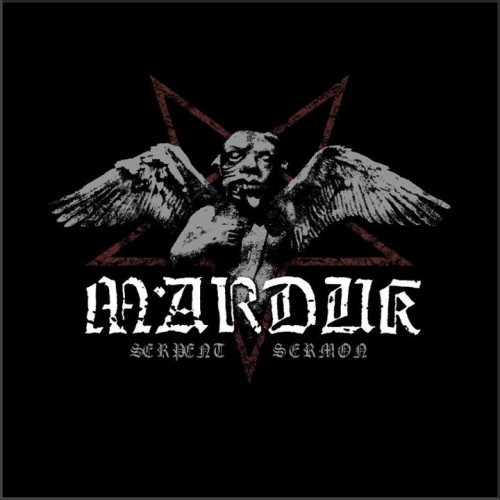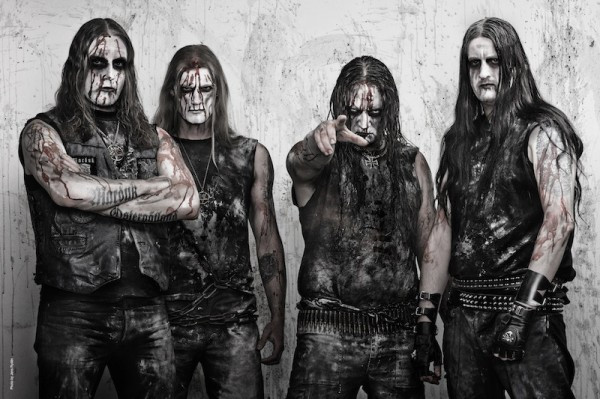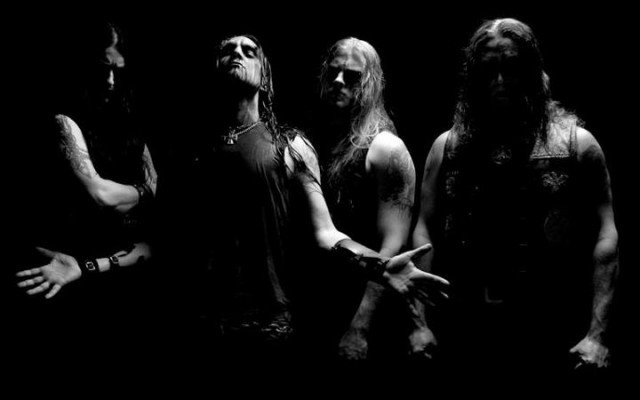
(Andy Synn reviews the new album from Sweden’s Marduk.)
This is set to be a big year for black metal, with both the new gods and the old primed for a resurgence. Both the Swedish progenitors of primal, black metal orthodoxy are set to return in glory, with the satanic discipline of Dark Funeral set to be unleashed sometime before the year’s end, and now, harbingers of the apocalypse Marduk returning to the fray with this, their 12th album of aural devastation.
Remember that 2012 will see the end of all things, and in Marduk we have been given standard bearers of our own destruction, a fitting soundtrack to the final storm that will wipe this world clean of humanity’s infectious influence.
There is a clear distinction between the sound and feel of this album and that of its predecessor. Where Wormwood was arguably a fouler, dirtier sounding record, with an uncomfortable, decaying warmth to it, Serpent Sermon is far colder and more brittle, with more starkly presented dynamics, ready to snap and scar at a moment’s notice.
The production of this record serves to further highlight and accentuate the differences between the two albums. Whereas its predecessor was a roiling cauldron of filth and malice, thick yet fluid, Serpent Sermon is all shards and shadows, bleached bones and hard edges. That’s not to say that it doesn’t flow. It’s more akin to comparing two paintings of the same object, done in entirely different styles – one, a horrid and flowing concoction of hand-painted miasmas, the other a vivid hand-drawn nightmare of figure and form.

Considering that there have been several criticisms of Mortuus’ vocals and influence taking Marduk in a direction uncomfortably close to that of his own Funeral Mist, it’s interesting to note that Mortuus’ vocals serve to quite distinctly differentiate this album from its predecessor. Whereas on Wormwood his voice was a foul and fetid thing, freshly exhumed from its shallow grave, on Serpent Sermon his vocals have a sharper, more razor-edged feel to them. His usually oily and depraved delivery has seemingly been given an injection of sheer savagery, at times hitting a feverish pitch which ties into the work of his predecessors Erik “Legion” Hagstedt and Joakim Gothberg, bringing the many eras of Marduk full circle.
The martial, ominous beginning of “Serpent Sermon”, all blood-spattered cymbals and necrotic riffs, leads into a precision carpet-bombing of blasting snare and contorted tremolo melodies, the lethally calculated deployment of scything riffs and bone-crushing slowdowns a real throwback to the Panzer Division… era, with Mortuus adopting the dual role of both poet and preacher to lead his congregation in a downward spiral into damnation.
“Messianic Pestilence” actually manages to make the first track appear callous and restrained by comparison, delivering its message of hate in a full-on metallic blitzkrieg. The off-kilter, staccato sections allow the grumbling bass to come to full life, threading its way through the collapsing chaos around it, while the guitars buzz and crackle like a poisonous hornet’s nest. The track never relents its hold upon the listeners’ throats, choking the life out of them with its ever-tightening noose.
The noxious “Souls for Belial“ crafts an uneasy juxtaposition between nauseating slowness and dizzying speed, often juxtaposing these elements against one another in willful defiance of expectations. Pulse-racing kick drums drag cadaverous riffs in their wake, only to find themselves outstripped by ravenous tremolo runs which plunge the track over the edge into utter madness.
The domineering “Into Second Death” sits astride a hefty backbone of raging groove supplied by Devo’s rumbling bass-lines and Lars’ nimble hand-work, galloping forwards with a satyr’s priapic frenzy, before the track’s groaning, doom-laden chorus opens up into a looming, impenetrable abyss. The drums, so often overlooked in the pursuit of blasting self-immolation, shine here in their use of intricate beats and tempo shifts, revealing the cold reptilian intellect hidden behind the band’s ravenous hunger.
“Temple of Decay” bristles with dark promise, its haunting introductory melody stretched out and tormented to a tortuous length, simmering with menace and malevolence. The drums once again pierce the blackened fog with new-found power and clarity, all whip-crack snare and acidic cymbal crashes atop a tapestry of rolling, militaristic tom-fills. The guitars drown themselves in a torrential deluge of twisted, mutant harmonies, an all-enveloping rain of darkness that soaks through to the very marrow of the soul.

Eviscerating and enigmatic in equal measure, “Damnation’s Gold” is a trickster of a song, contorting itself through a series of bone-breaking, nerve-shredding transformations. Its initial blast-fury suddenly gives way to an unexpected left-turn of mangled chords and cracked, broken bass, before just as quickly switching magazines to scald the listener with another berserk eruption of blasting ferocity. Huge, angular chords and booming drums take the song by the horns and force it once more into another new shape, turning the all-out assault into a stomping, riff-heavy purgation. The near-suicidal frenzy of the track belies the subtle technicality at play, each scything tremolo riff and barbed hook calculated perfectly to deliver a lethal dose of metallic venom.
Brutal and blasphemous “Hail Mary (Piss-Soaked Genuflexion)” is, stunning title aside, a future classic that from the start unleashes a barrage of hyper- adrenalized riffs and hypnotic, winding bass-lines. Mortuus spits forth fire and brimstone, twisting his forked tongue around the song’s hook-filled, heretical chorus refrain, while the drums manifest in vibrant, demonic fashion, ringing cymbal strikes and scattershot snare blasts hitting their target again and again with unerring precision.
There is a subtle method behind the madness of this album, epitomised by the chaotic ingenuity of “M.A.M.M.O.N.”, crafting melody out of dissonance to create unearthly harmonies, flowing like blood from an open wound. The distorted harmonics that make up the track’s dirge-like chorus manage to be both unnerving and compelling at the same time, insinuating themselves beneath the listener’s skin while Mortuus’ filth-encrusted vocals and Morgan’s tortuous, anti-melodic leads entwine in serpentine copulation.
The devastating “Gospel of the Worm” is a throwback to the days when heavens would burn at the very mention of the name Marduk, shot-through with downward spiraling chaos melodies and corrupted thrash riffs, twisted almost beyond recognition. It again showcases the group’s ability to create crushing, seductive riffs out of utterly dissonant and desolate ingredients, powering on the pressure until it reaches critical mass.
The finale of “World of Blades” is not the flesh-stripping assault of relentless blasting you might have expected. Instead, it crawls out from its cocoon like the larval form of something much greater, rich with the potential for death and destruction, tasting the air with its new-formed senses. Almost ballad-like, it drifts languidly and sensually, carrying with it the stale stench of the tomb, driven onwards by sinuous, creeping bass-lines which flood the track with unholy, hypnotic melody. Like a lotus flower, the track slowly unfurls itself, each petal unleashing a sedative haze of despair. It’s an unexpected, but undeniably effective, conclusion to the record, reaching far back to the group’s earliest years to reinvigorate a spirit last heard on Opus Nocturne.
There’s something different about this record which sets it apart, but I’m having difficulty putting it into words. It comes across as a distillation of elements drawn from across the band’s back catalogue, instead of a direct follow-on from Wormwood. Elements of that album still remain, as do inflections of all their past works, but it is as if Marduk have been experimenting with their own genetic structure, teasing out strands of DNA from all their incarnations and weaving them together to produce a chimeric concoction of sound and vision. Though the serpent remains, the sermon has transformed.
EDITOR’S NOTE: Serpent Sermon was self-produced by the band and will be released by Century Media on June 5. Combo packs for the album can be pre-ordered here (U.S.) or here (Europe). Marduk can be found on Facebook via this link, and their official web page is here. We’ve previously featured the band’s official video for “Souls for Belial”, but one good turn deserves another:

@islander if it is the end of the world we should meet have beers and listen to Marduk \m/
This sounds like a kickass black metal offering, and I for one will get this on iTunes asap!